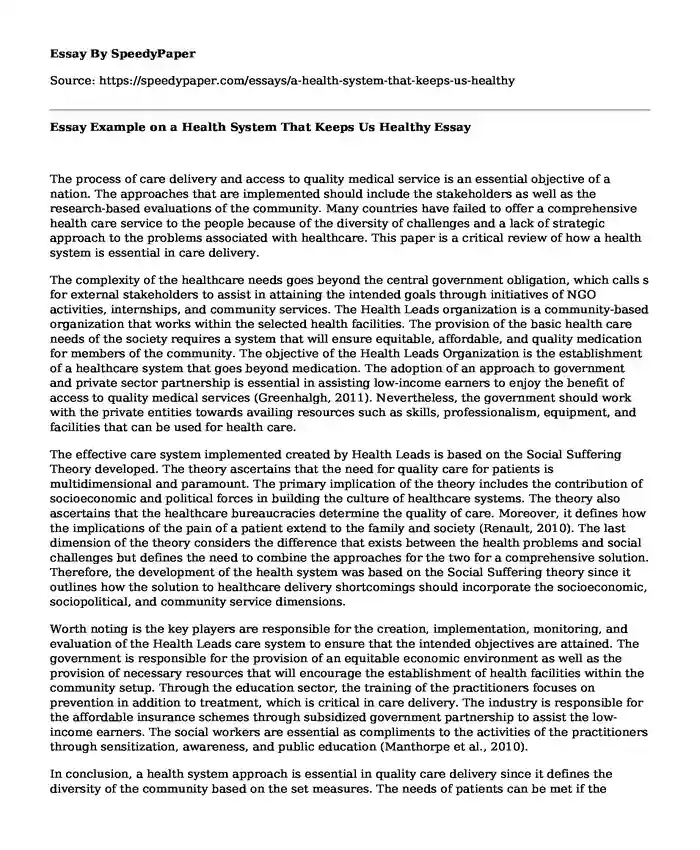
| Type of paper: | Essay |
| Categories: | Medicine Government |
| Pages: | 3 |
| Wordcount: | 649 words |
The process of care delivery and access to quality medical service is an essential objective of a nation. The approaches that are implemented should include the stakeholders as well as the research-based evaluations of the community. Many countries have failed to offer a comprehensive health care service to the people because of the diversity of challenges and a lack of strategic approach to the problems associated with healthcare. This paper is a critical review of how a health system is essential in care delivery.
The complexity of the healthcare needs goes beyond the central government obligation, which calls s for external stakeholders to assist in attaining the intended goals through initiatives of NGO activities, internships, and community services. The Health Leads organization is a community-based organization that works within the selected health facilities. The provision of the basic health care needs of the society requires a system that will ensure equitable, affordable, and quality medication for members of the community. The objective of the Health Leads Organization is the establishment of a healthcare system that goes beyond medication. The adoption of an approach to government and private sector partnership is essential in assisting low-income earners to enjoy the benefit of access to quality medical services (Greenhalgh, 2011). Nevertheless, the government should work with the private entities towards availing resources such as skills, professionalism, equipment, and facilities that can be used for health care.
The effective care system implemented created by Health Leads is based on the Social Suffering Theory developed. The theory ascertains that the need for quality care for patients is multidimensional and paramount. The primary implication of the theory includes the contribution of socioeconomic and political forces in building the culture of healthcare systems. The theory also ascertains that the healthcare bureaucracies determine the quality of care. Moreover, it defines how the implications of the pain of a patient extend to the family and society (Renault, 2010). The last dimension of the theory considers the difference that exists between the health problems and social challenges but defines the need to combine the approaches for the two for a comprehensive solution. Therefore, the development of the health system was based on the Social Suffering theory since it outlines how the solution to healthcare delivery shortcomings should incorporate the socioeconomic, sociopolitical, and community service dimensions.
Worth noting is the key players are responsible for the creation, implementation, monitoring, and evaluation of the Health Leads care system to ensure that the intended objectives are attained. The government is responsible for the provision of an equitable economic environment as well as the provision of necessary resources that will encourage the establishment of health facilities within the community setup. Through the education sector, the training of the practitioners focuses on prevention in addition to treatment, which is critical in care delivery. The industry is responsible for the affordable insurance schemes through subsidized government partnership to assist the low-income earners. The social workers are essential as compliments to the activities of the practitioners through sensitization, awareness, and public education (Manthorpe et al., 2010).
In conclusion, a health system approach is essential in quality care delivery since it defines the diversity of the community based on the set measures. The needs of patients can be met if the government and the practitioners work together for resources and implementations respectively. The services of social workers are critical in sensitization and society education as methodologies for prevention and awareness.
References
Greenhalgh-Stanley, N. (2011). Can the government Incentivize the purchase of private long-term care insurance? Evidence from the long-term care partnership program. SSRN Electronic Journal. http://doi.org/10.2139/ssrn.2316849
Manthorpe, J., Martineau, S., Moriarty, J., Hussein, S., & Stevens, M. (2010). Support workers in social care in England: A scoping study. Health & Social Care in the Community, 18(3), 316324. http://doi.org/10.1111/j.1365-2524.2010.00910.x
Renault, E. (2010). A critical theory of social suffering. Critical Horizons, 11(2), 221241. http://doi.org/10.1558/crit.v11i2.221
Cite this page
Essay Example on a Health System That Keeps Us Healthy. (2019, Oct 11). Retrieved from https://speedypaper.net/essays/a-health-system-that-keeps-us-healthy
Request Removal
If you are the original author of this essay and no longer wish to have it published on the SpeedyPaper website, please click below to request its removal:
- Marketing Essay Sample on The Coca-Cola Company and Diet Coke
- Free Essay: Cutting Government Spending Is Not Best Option to Reduce Federal Deficits
- Free Essay on the Economic Impact of Butaro Hospital on the Rwandan Economy
- Essay Example about Team Goals
- Introduction and geographic distribution
- Case Study- E-Freight Project by IATA. Free Essay
- Essay Sample on Nurse Practitioner Practice Authority State-To-State Comparison
Popular categories




